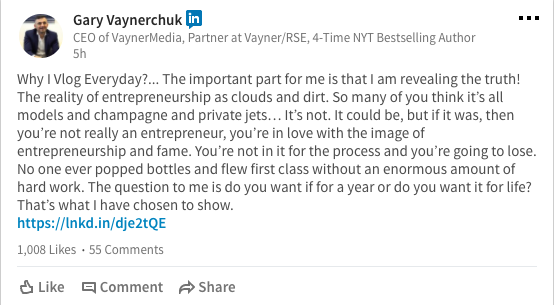The rise of social media has thrust personal branding into the mainstream. And while many celebrities have been born on consumer platforms like Instagram or YouTube, and others, like, say, President Trump, thrive on Twitter, in the advertising business, the place to shout “I’m a thought leader” is LinkedIn.
Once a place to professionally network, LinkedIn has evolved into a vehicle for marketing execs to weigh in on the hottest industry topics du jour in blog posts, self-promote and even dish out advice on entrepreneurship in their status updates.
“LinkedIn has become far more cluttered with these marketing gurus recently than it used to be,” said Eric Schiffer, CEO of reputation management firm Reputation Management Consultants. “The presupposition is that it makes you appear more credible in business.”
The gold rush for personal fame on LinkedIn can, in part, be attributed to LinkedIn’s own evolution as a platform. A key feature of this is its influencer program, an official invite-only program comprised of around 500 of the world’s top business leaders who regularly share news and insights on the platform. The program has helped propel advertising heavyweights like VaynerX and VaynerMedia CEO Gary Vaynerchuk and Y&R CEO David Sable to even greater heights, giving them access to wider audiences and a chance to further their influence beyond advertising.
“One of the reasons I like LinkedIn is because it is a broader audience, I’m interested in business in general, not necessarily just advertising,” Sable told Business Insider. “I’m always learning from people’s responses-it’s interesting to read comments and see what people respond to.”
Executives from the advertising industry make up less than 5% of executives in the influencer program. Still, that success, combined with the self-aggrandizing nature of social media, means that now seemingly everyone in the industry can-and aspires to build-his or her personal brand on LinkedIn, said Tom Goodwin, head of innovation at Zenith.
"We are an industry that relies on reputation, where it is important to be known," Goodwin, who is a LinkedIn influencer himself, said. "I have had people from the industry starting to regularly ask me to like or comment on what they share and ask me what my secret sauce is. They roll their eyes when I tell them to talk about what they actually are passionate about."
'Ridiculous and pathetic epithets'
Take, for example, Adam Kleinberg. The CEO at agency Traction is unabashed in his use of LinkedIn as a personal branding tool. He shares posts and thoughts on LinkedIn at least twice a month and said that it has been extremely valuable for building business connections.
"There is generally a high degree of engagement, and I keep a close eye on who is liking or commenting on my LinkedIn posts," he said. "I'm constantly hearing from people that they 'see Traction everywhere in the news,' but the place they see us everywhere is LinkedIn."

The influx of advertising execs keen to boost their personal brands has turned some, including Sean Cummins, global CEO of Cummins & Partners, off from the platform. Cummins, who hasn't hesitated to call people (including Vaynerchuk and Ogilvy & Mather copy chief George Tannenbaum) out in what many may term as trolling, said that LinkedIn had become full of "ridiculous and pathetic epithets."
"You could fill up a whole room with all the ridiculous stuff that hits my LinkedIn," he said. "It's just a lot of self-aggrandizement and innutritious wisdom."
Not everyone, however, buys into the argument that LinkedIn has become a personal branding tool and a way for the ad industry to puff each other up. Certainly not Vaynerchuk himself.
"I think that's silly. LinkedIn is a massive recruitment and data tool, and content is a nice to have and far from its core," he said. "People will always be cynical to other people's quest to disseminate content and that's that."

